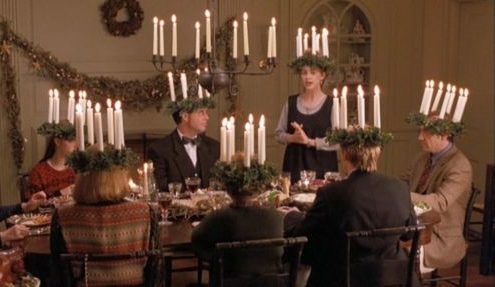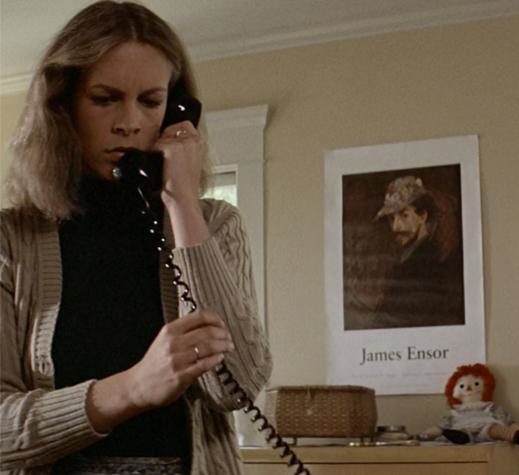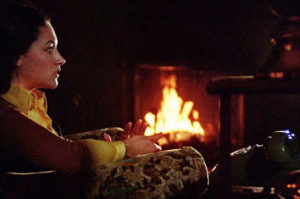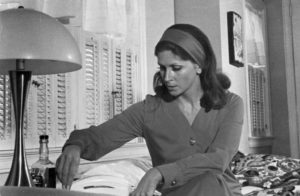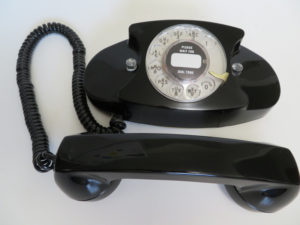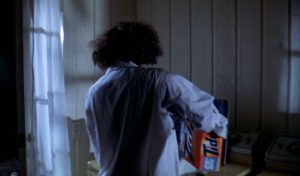I think we are all aware of the meme of Die Hard as a Christmas film. The arbiters of coolness decided there was something a bit cringe about the people who claimed it as their favorite holiday film. Like, “Hey, forget It’s a Wonderful Life normies, I’m the freaky sort of dude who thinks Die Hard is the best Christmas film.” As the title of this blog entry indicates, I haven’t seen Die Hard so I am not in a place to dissect the meme but I have sympathy for people who dare deviate from the more staid Christmas canon. Half the films I consider my favorite Christmas films can charitably be considered garbage. Who am I to question anyone’s else’s tastes in or motives behind liking specific holiday films?
And here is where I completely contradict myself because I sort of wish I could launch a Christmas movie reverse class action lawsuit. Instead of a bunch of plaintiffs, it would just be me suing everyone who ever told me, “Oh my god, you have to see Love, Actually. It’s the best Christmas movie ever!” I did watch it and I was flabbergasted at how horrible it was. Snape destroys his marriage to Professor Trelawney buying jewelry for a side piece he hadn’t nailed yet. Rick Grimes dances in cringe to Dido as he pines for Elizabeth Swann. Mr. Darcy decides the capacity to speak to one’s soul mate should be optional. The movie insists that the (American) size ten woman Hugh Grant, at his most gormless, falls in love with, is fat. Liam Neeson takes romantic advice from a child, as you do. Let us not discuss the low-IQ scumbag whose entire life goal is to… have sex with every woman ever, I guess. The Laura Linney and Bill Nighy sections were the best but they cannot redeem this bizarre vehicle of second-hand embarrassment. Seriously, this movie was so shamelessly cringe that I worried my colon might prolapse before it ended.
With the above rant in mind, here’s my list of my favorite Christmas-themed films. Also, you should know that if I attempt something like this again in the future, the list will likely be different. Stability of opinion is for losers!
1. The Ref
On the surface, it looks like a dark comedy that ends with family redemption. A husband and wife leaving marital therapy are taken hostage by a thief after a failed heist. He forces them to take him to their home where they have to navigate an already tense Christmas family gathering while they pretend he is their therapist lest he kill them. The couple actually ends up repairing their fractured marriage and the genuinely bad people get what is coming to them, hurrah. Sounds like bog standard Hallmark channel stuff, right? The hook to this film is the cast. I dare you to find a Christmas movie with more distasteful leads.
The wife is played by Judy Davis, roundly considered by many in the film industry to be absolutely venomous to work with. Her condescending nastiness to River Phoenix on the aborted film, Dark Blood, made his life such a living hell that some believe it accelerated the drug abuse that led to his overdose. I cannot do justice to her awfulness in what I hope will not be a terribly long article so look it up.
The husband is played by Kevin Spacey, and I don’t even know what is happening anymore with him. Was it a witch hunt? Was he an indiscriminate horn dog and didn’t realize what a menace he was? Is he an abuser whose reputation is tarnished but evaded punishment? I don’t know, but the whole mess around him is unavoidable when mentioning he is in a film.
The robber is played by Denis Leary. People of my age and time and specific social milieu hold Denis Leary in some contempt. His outright theft of the late Bill Hicks’ comedic persona and jokes will always leave a bad taste in my mouth. When he was coming up and establishing himself, he was one of the most called-out thieves of intellectual property.
So you get to watch a harridan, a possible pervert and Denis Leary battle it out, with appearances by Christine Baranski, Vincent Pastore, and J.K. Simmons. Also prepare yourself for lots of mentions of cat piss. Good times.
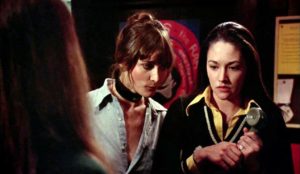 The original is the best – the remakes all make me itch because I sort of wanted everyone in the 2006 version to get killed. The more recent release was so bad I could not make it through it. The original is just amazing in a 1970s sort of way. Sorority girls don’t know the call is coming from inside the house, abortion is a plot point, Margot Kidder stole the movie (I sense she was “behaving” more than “acting” but who cares because she was hilarious), an entire police force as well as the emergency medical services accidentally leave a comatose woman alone in a house after she survived a murderous rampage, and Andrea Martin is stealth-hot, especially when she is wearing that crocheted shawl tied around her shoulders. Add in John Saxon and a police officer who has very limited exposure to blow jobs and you really can’t miss with this film.
The original is the best – the remakes all make me itch because I sort of wanted everyone in the 2006 version to get killed. The more recent release was so bad I could not make it through it. The original is just amazing in a 1970s sort of way. Sorority girls don’t know the call is coming from inside the house, abortion is a plot point, Margot Kidder stole the movie (I sense she was “behaving” more than “acting” but who cares because she was hilarious), an entire police force as well as the emergency medical services accidentally leave a comatose woman alone in a house after she survived a murderous rampage, and Andrea Martin is stealth-hot, especially when she is wearing that crocheted shawl tied around her shoulders. Add in John Saxon and a police officer who has very limited exposure to blow jobs and you really can’t miss with this film.
3. Metropolitan
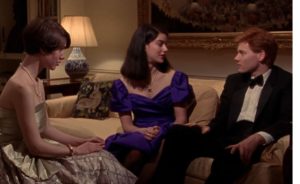 I saw this film when I was deep in my The Secret History/Mitford Sisters/Mary McCarthy’s The Group/Salinger-esque-fueled adulation of old money and the veneer of class. In this Whit Stillman vehicle from 1990, a group of monied college kids in Manhattan home for the holidays permit a less privileged and intellectually pompous peer, Tom, into their group. One of the kinder, intelligent young women, Audrey, has a crush on Tom, while her old friend Charlie pines for her and tries to repel Tom. Tom has eyes for another girl in this wealthy cadre, and the group attend debutante balls, have long after-parties, and engage in very aristocratic and very tame debauchery. Audrey and Tom navigate what they really want from life, I got to watch lots of preppy decor porn, and all in all it was an amusing, strangely sweet film. I would have picked Charlie, though, had I been Audrey. His self-deprecating earnestness and neuroticism were very appealing to me then and now. Repeat after me: Urban Haute Bourgeoisie.
I saw this film when I was deep in my The Secret History/Mitford Sisters/Mary McCarthy’s The Group/Salinger-esque-fueled adulation of old money and the veneer of class. In this Whit Stillman vehicle from 1990, a group of monied college kids in Manhattan home for the holidays permit a less privileged and intellectually pompous peer, Tom, into their group. One of the kinder, intelligent young women, Audrey, has a crush on Tom, while her old friend Charlie pines for her and tries to repel Tom. Tom has eyes for another girl in this wealthy cadre, and the group attend debutante balls, have long after-parties, and engage in very aristocratic and very tame debauchery. Audrey and Tom navigate what they really want from life, I got to watch lots of preppy decor porn, and all in all it was an amusing, strangely sweet film. I would have picked Charlie, though, had I been Audrey. His self-deprecating earnestness and neuroticism were very appealing to me then and now. Repeat after me: Urban Haute Bourgeoisie.
4. Scrooged
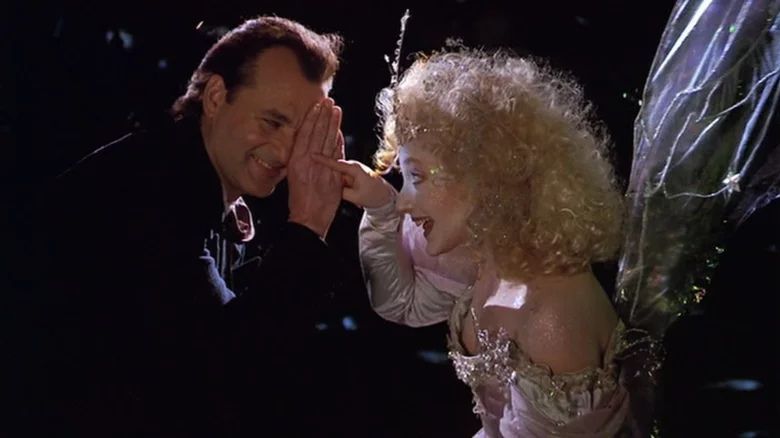 You cannot convince me that the scenes where the Ghost of Christmas Present, played by Carol Kane, runs Bill Murray through the wringer are not some of the funniest scenes in cinema. This is just an hilarious retelling of The Christmas Carol, with David Johansen, Karen Allen, and Bobcat Goldthwait. Aside from being a film that has both Robert Mitchum and the Solid Gold Dancers in it, the movie brings little new to the Christmas table, but it’s funny, sentimental and I have a strong and enduring crush on Bobcat, so this one may only appeal to me. Still, give it a look.
You cannot convince me that the scenes where the Ghost of Christmas Present, played by Carol Kane, runs Bill Murray through the wringer are not some of the funniest scenes in cinema. This is just an hilarious retelling of The Christmas Carol, with David Johansen, Karen Allen, and Bobcat Goldthwait. Aside from being a film that has both Robert Mitchum and the Solid Gold Dancers in it, the movie brings little new to the Christmas table, but it’s funny, sentimental and I have a strong and enduring crush on Bobcat, so this one may only appeal to me. Still, give it a look.
5. In Bruges
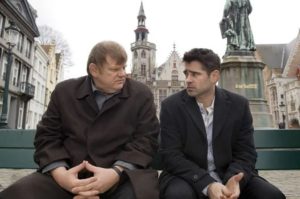 Not sure if this is a dark comedy or a thriller with some funny moments, but this film is a Christmas gem. Colin Farrell plays a bumbling gangster who made such a huge mistake that his boss, Ralph Fiennes, wants him killed but also wants him to have a nice time before he is executed. So he sends him to Bruges, Belgium with Brendan Gleeson, who is told to show the doomed young man a good time before he kills him. Half the reason to watch this film is to take in how beautiful Bruges is during the holidays and to hear Ralph Fiennes shout, “You’re an inanimate fucking object!”
Not sure if this is a dark comedy or a thriller with some funny moments, but this film is a Christmas gem. Colin Farrell plays a bumbling gangster who made such a huge mistake that his boss, Ralph Fiennes, wants him killed but also wants him to have a nice time before he is executed. So he sends him to Bruges, Belgium with Brendan Gleeson, who is told to show the doomed young man a good time before he kills him. Half the reason to watch this film is to take in how beautiful Bruges is during the holidays and to hear Ralph Fiennes shout, “You’re an inanimate fucking object!”
6. Bad Santa
 Mr OTC loves this film and I quite like it, too. Billy Bob Thornton plays a dissolute Santa who, along with a dwarf who plays an elf, robs malls. Serving as a mall Santa permits him to case department stores for huge Christmas Eve heists. With police sniffing out his motel room, Thornton inveigles his way into the home of a bullied kid who lives with his senile grandmother while his father is in prison. The film cast includes the late John Ritter, Cloris Leachman, and Bernie Mac, as well as the still-living mom from The Gilmore Girls. Bernie Mac was the scene-stealer in this film.
Mr OTC loves this film and I quite like it, too. Billy Bob Thornton plays a dissolute Santa who, along with a dwarf who plays an elf, robs malls. Serving as a mall Santa permits him to case department stores for huge Christmas Eve heists. With police sniffing out his motel room, Thornton inveigles his way into the home of a bullied kid who lives with his senile grandmother while his father is in prison. The film cast includes the late John Ritter, Cloris Leachman, and Bernie Mac, as well as the still-living mom from The Gilmore Girls. Bernie Mac was the scene-stealer in this film.
7. Inside
 Part of the French New Wave of horror, this is a tense, upsetting film that is pretty tight and well-executed, and included an ending that I both hated but concede was the best way for the movie to end. Sarah, a pregnant widow, is home alone on Christmas Eve, preparing for her induction on Christmas day. However, a woman breaks into her home in an attempt to kill her and take the baby she is carrying, and Sarah does all she can to save herself and her unborn child. It’s a grim, gripping, bloody film and one of the few “Christmas” films I watch year-round. I know there has been an American remake but I find artsy European horror translates poorly when under the control of Americans. I use Funny Games and The Vanishing as examples. Just stick to the original with this one.
Part of the French New Wave of horror, this is a tense, upsetting film that is pretty tight and well-executed, and included an ending that I both hated but concede was the best way for the movie to end. Sarah, a pregnant widow, is home alone on Christmas Eve, preparing for her induction on Christmas day. However, a woman breaks into her home in an attempt to kill her and take the baby she is carrying, and Sarah does all she can to save herself and her unborn child. It’s a grim, gripping, bloody film and one of the few “Christmas” films I watch year-round. I know there has been an American remake but I find artsy European horror translates poorly when under the control of Americans. I use Funny Games and The Vanishing as examples. Just stick to the original with this one.
8. ATM
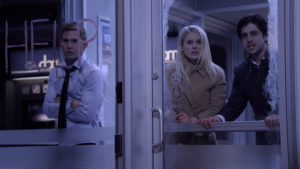 Boy who screwed over investors meets girl at office Christmas party. Girl accepts ride home. Boy’s jackass friend demands a ride too, plus a stop at an ATM so he can get money for some post-party snacks. Little do they know the ATM kiosk they visit is the hub of a murderous madman’s midnight antics and they have to find a way to get help or escape. It’s a pretty nice, claustrophobic little horror film but it also makes no sense in a “how on earth could anyone pull that off and why would they bother in the first place” sort of way, so don’t overthink it.
Boy who screwed over investors meets girl at office Christmas party. Girl accepts ride home. Boy’s jackass friend demands a ride too, plus a stop at an ATM so he can get money for some post-party snacks. Little do they know the ATM kiosk they visit is the hub of a murderous madman’s midnight antics and they have to find a way to get help or escape. It’s a pretty nice, claustrophobic little horror film but it also makes no sense in a “how on earth could anyone pull that off and why would they bother in the first place” sort of way, so don’t overthink it.
9. P2
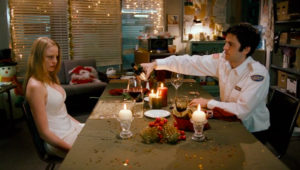 An executive who works in a New York high rise is stalked by one of the building’s security guards and taken hostage on Christmas Eve. It brings little new to the table yet manages to be a very tense film. Wes Bentley, who is in real life a bit of a lunatic, plays the demented, lovelorn guard to perfection. I enjoyed his performance so much I began to root for him in a weird kind of way, even as I felt the tension as the heroine engaged in absolute mayhem to save herself.*
An executive who works in a New York high rise is stalked by one of the building’s security guards and taken hostage on Christmas Eve. It brings little new to the table yet manages to be a very tense film. Wes Bentley, who is in real life a bit of a lunatic, plays the demented, lovelorn guard to perfection. I enjoyed his performance so much I began to root for him in a weird kind of way, even as I felt the tension as the heroine engaged in absolute mayhem to save herself.*
10. Christmas Evil
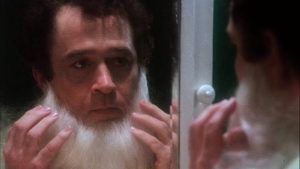 John Waters considers this his favorite Christmas movie. It’s the story of a kid who accidentally sees his dad, dressed as Santa, engage in what Joe Bob Briggs would call “aardvarking” with his mom, and it ruins him. He grows up to become obsessed with Christmas and human goodness, manages a toy factory, and keeps his own list of naughty and nice children. I’ll let John Waters explain the rest:
John Waters considers this his favorite Christmas movie. It’s the story of a kid who accidentally sees his dad, dressed as Santa, engage in what Joe Bob Briggs would call “aardvarking” with his mom, and it ruins him. He grows up to become obsessed with Christmas and human goodness, manages a toy factory, and keeps his own list of naughty and nice children. I’ll let John Waters explain the rest:
He breaks into people’s houses on Christmas Eve and wedges his fat ass down the chimney to deliver presents. The parents freak out and try to kill him but the kids save him and at the end he takes off on his sleigh.
Except his sleigh is a van, he gives away tons of gifts to orphans, kills an evil capitalist, crashes a Christmas party at a bar that is strangely full of kids and absolutely wrecks his brother’s life forever. This is not a film that attempts to be funny, though some think it is a comedy because of Waters’ synopsis. It’s actually a film about the relentless corruption of innocence and the way that the sacred is made profane though the pursuit of profit. But there are moments so ridiculous that keep it from being a pathos-laden slog. It’s serious but over-the-top, the character with principles is the villain, and Christmas has never before been this grimy.
Tell me about your favorite Christmas films. Do you want to ruin my day and explain why Love, Actually is a masterpiece? Can you explain why Terrifier 3 was so awful? What movie do you watch every year at Christmas?Share away, my friends!
*Can currently be watched for free on Amazon Prime Movie.
